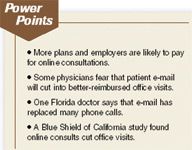Article
Online "visits": Insurers pay but docs don't play
Insurers are finally reimbursing for e-mails with patients, but physicians are worried about losing office visits.
More than a dozen health insurers in several states have begun reimbursing doctors for online consultations with patients. But even though medical societies have been pushing for years to get reimbursement for such e-mails, doctors have greeted the news with a big yawn. Not many are doing online consults, even though they can now get paid for them.

"That's a very big concern," says internist Keith Dipboye, Jr., of Seattle's Virginia Mason Medical Center, which is testing secure e-mail with patients employed by Microsoft. On the other hand, he views the online consults, which are reimbursed through Premera Blue Cross, as a potential way to improve chronic care. And because his practice is so busy, he says, e-mail could improve his efficiency without reducing office visits.
Internist Lynne M. Kirk, president of the American College of Physicians, acknowledges that a reduction in office visits is a "theoretical" problem. But she points out that not every health issue requires a face-to-face encounter; for instance, a hypertensive patient could e-mail a blood pressure reading to his doctor so that he could adjust his medication. Online consultations, she adds, can be a real asset in helping patients manage their chronic diseases and in dealing with minor acute illnesses. Whether an e-mail exchange replaces a visit or leads to one, she says, "Our goal is to give the right care to the patient at the right time." So the ACP hopes that more plans will pay for e-mail.
That's very likely to happen for a variety of reasons, including the desire of employers to increase productivity and to get employees more engaged in their care. Here's how some physicians are dealing with-and embracing-this new medium, and why a growing number of plans are promoting it.
What doctors like-and dislike-about online consults
Leslie D. Wilson, a family physician in Tallahassee, FL, and his wife, also a family doctor, have been using a secure messaging service called RelayHealth for about a year. Aetna and Blue Cross and Blue Shield of Florida are now paying the practice about $150 a month for online consults through RelayHealth. The Wilsons also receive e-mails through a patient portal-a website used for secure messaging-that's attached to their electronic health record. About 20 percent of their patients have signed on to one of the portals, and the two physicians receive about 15 clinical messages a day. But they're reimbursed only for the consults they do through RelayHealth, which is the service that most plans are using.
Wilson says he'd probably do online "visits" with patients even if he weren't being paid for them. "It doesn't generate a tremendous amount of revenue, but it enhances your efficiency and increases the communication with patients."





